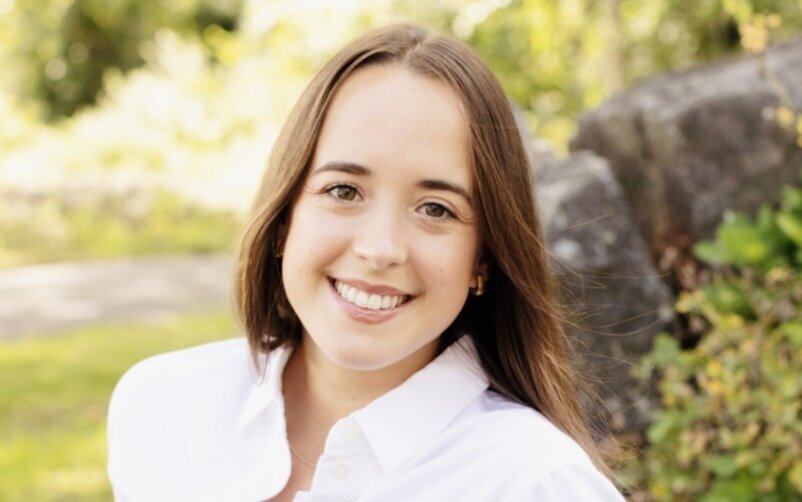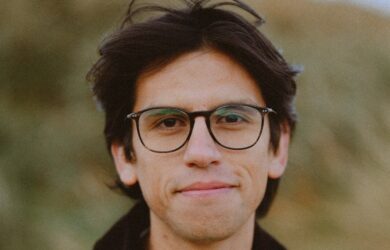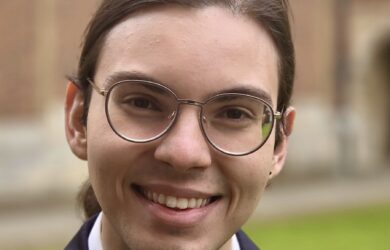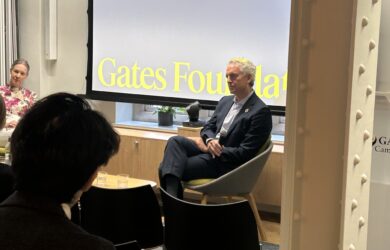
Christine Carpenter is a lawyer interested in the intersection of technology and law, particularly with regard to women's reproductive rights
Women do not realise how much information tech companies have about them, and how little they need to do to trigger indications that they may be considering or seeking an abortion.
Christine Carpenter
What legal protections exist to protect women from having their fertility and period-tracking data used against them to suggest they have had an abortion or used contraception? After the overturning of Roe v. Wade in the US the prospect of that data being used against women in court could be a reality for many women, says lawyer Christine Carpenter [2024].
Her PhD is looking at the industry known as FemTech (short for “Female Technology”) and data privacy protection law in the larger context of digital surveillance. She is interested in the risk individuals who use fertility and period-tracking apps run in terms of having their data potentially subpoenaed and used in court to show they have had an abortion.
She says there are currently no regulations in place regarding access to the data on these apps in the US and many other states where FemTech products operate. The data can be sold on the market and bought by third parties who could de-anonymise it and supply it to law enforcement, prosecutors or private citizens for the right price. If, for instance, a woman uses an app to report her periods and then there is a gap in her period, reporting it could be used to show she has had an abortion, which could result in a fine or a prison sentence in many US states.
Christine thinks FemTech companies need to get ahead of potential legislation and women need to be more aware of the risks of using the apps. She says: “Women do not realise how much information these companies have about them, and how little they need to do to trigger indications that they may be considering or seeking an abortion. It is very unsettling.”
Early years
Christine grew up with a strong female role model who got things done. Born in Pittsburgh, Pennsylvania, she grew up in New Hampshire where her mother was one of just two women leaders at a national company in the 80s and 90s. Due to the lack of affordable childcare infrastructure, she opted to be a stay-at-home mother while Christine and her brother were growing up. However, she also set up non-profit organisations and campaigned for better local infrastructure, including securing funding for the public high school Christine attended.
Christine describes the school as very high-achieving. There was a lot of competition and pressure to achieve academically. Christine, who composed music and performed in five bands at school, mainly on the flute and piccolo, didn’t consider herself as being as driven or clever as some of her fellow students, but she took advanced classes in the subjects she loved, including history, social studies and ethics. Her ethics teacher, a lawyer, wrote across one of her term papers ‘you need to go to law school’.
Christine also ran the Model UN Club at her high school, which led to her majoring in International Relations at Lafayette College, a small liberal arts college in Pennsylvania. She took a range of different classes, from law to history, and did her thesis on laïcité [secularism] in French public schools. Christine had studied in Paris in 2016 when the burqa ban was a hot topic. Her senior thesis advisor recommended that she apply for a master’s in International Relations at the University of Cambridge.
For her master’s dissertation she focused on religious freedom, such as the right to wear religious clothing, as laid down in Article 9 of the European Convention on Human Rights. Her interest was in the co-option of legal principles to target specific groups of people and the fact that the law was not applied consistently to all groups.
Law
Before she moved to the UK, Christine started studying for the Law School Admission Test and was applying to law schools in her first term in Cambridge. She says her time at Cambridge was characterised by hard work, but that work has been very useful in her career as a lawyer, particularly the international constitutional law course.
Christine returned to the US to the University of Pennsylvania Law School in 2018 after completing her master’s. The school has a high employability rating which, she says, means it has a more collegial culture than many other similar schools in the US. Halfway through her second year Covid hit. Christine and her fellow students were told to stay at home. She did a virtual externship [an internship during term time] with the Federal Community Defenders, a public defenders organisation, working in the appellate team and doing a research project on digital evidence.
She graduated the following summer and was called to the New York bar in July 2021. In September that year she began working in litigation for one of the so-called ‘Big Law’ firms, Dechert. There, she practised international arbitration and worked on investor-state arbitration cases where states or investors in a state with an investment treaty come into conflict.
She also maintained an active pro bono practice of matters concerning international human rights and international criminal law. This involved, for example, working with the Human Trafficking Legal Clinic to seek justice for migrant workers in diplomatic households in proceedings before the Inter-American Court of Human Rights and with the Center for Reproductive Rights in proceedings challenging Texas’ 2021 law on abortion, the first six-week abortion ban in the US since Roe v. Wade. In addition she helped to draft comments on the International Criminal Court’s policy guide for gender-based crimes with the Public International Law & Policy Group, and supervised student research on the applicability of international law in cyberspace with Temple University Law School’s Institute for Innovation, Law & Technology.
The overturning of Roe v Wade
Christine really enjoyed working as a lawyer, but after three years she wanted to move back into academia and specialise in the intersection of law and technology. In June 2022, in the case of Dobbs v. Jackson Women’s Health, the US Supreme Court overturned the constitutional protection for pre-viability abortion confirmed in Roe v. Wade. That and subsequent developments in relation to the anti-abortion movement crystallised what she wanted to do. She applied to Cambridge once more and was accepted.
She is keen to highlight the risks women face and to work on legal protections for them. She says: “I want to harness my experience as a litigator and researcher at the intersection of law and technology to build a project aimed at investigating the burgeoning global data economy surrounding FemTech, and how to protect the data ecosystem of FemTech products from misuse and abuse under the incentive structures created by legal regimes that are hostile to reproductive freedoms.”












